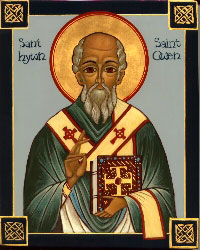
Feastday: August 24
Birth: 609
Death: 686
Ouen is also known as Owen and Audoenus. He was the son of St. Authaire and was born at Sancy near Soissons, France. He was educated at St. Medard Abbey, served at the courts of King Clotaire II and his son Dagobert I, who made him his chancellor and in 636 built a monastery at Rebais. He was pursuaded not to become a monk there by Dagobert, and despite the fact that Ouen was a layman, he was active in promoting religion and combating simony. He was continued as chancellor by King Clovis II, was ordained and in 641, was consecrated archbishop of Rouen. He encouraged learning and the founding of new monasteries, was known for his personal austerities and his charities, and supported missionary activities to pagan areas of his See. He supported Ebroin, mayor of the palace, against the nobles, and at the invitation of Thierry III, negotiated a peace between Neustria and Austrasia in Cologne. He died at Clich near Paris on August 24 while returning from Cologne. His feast day is August 24.
Frankish bishop, courtier, chronicler, and Christian saint "Saint Ouen" redirects here. For other uses, see Saint-Ouen (disambiguation).Audoin (AD 609 – on 24 August 684; also spelled Audoen, Ouen, Owen; Latin: Audoenus; known as Dado to contemporaries) was a Frankish bishop, courtier, hagiographer and saint.
Life
Audoin came from a wealthy aristocratic Frankish family who held lands in the upper Seine and Oise valleys. His father was Saint Authaire (Audecharius). Audoin was a first cousin of Agilbert, bishop of the West Saxons. He spent his childhood at Ussy-sur-Marne, and was then sent to be educated at the Abbey of Saint-Médard de Soissons. From there he went to the court of Chlothar II (d.629), where training both military and literary was given to young noblemen, he served Dagobert I as one of his referendaries (administrators). "Clothar's household seems to have been of particular importance in determining who was to be of political importance for the next two reigns."
Court official
He was part of a group of young courtiers like Saint Wandrille and Saint Didier of Cahors and was a close friend of Saint Eligius, whose vita he wrote. He and Eligius served as royal envoys to persuade Amadus to baptize Dagobert's son. According to Ian Wood, "...Audoin and Eligius were arguably the most influential churchmen in Francia during the seventh century."
In 634 Audoin was ordained priest by Dieudonne, Bishop of Mâcon. The following year, he and his brothers Ado and Rado founded Rebais Abbey, on land donated by King Dagobert. Audoin appointed his relative, Agilus, as first abbot. He also took part in the founding of Saint-Wandrille monastery in Rouen, and a nunnery at Fécamp. Fredegar reports that even as court referendary, Audoin had a reputation of being a religious man. He spent a year as a missionary in Spain, during which a drought was ended through his prayers
Bishop
 Saint Ouen reliques de saint Eloi
Saint Ouen reliques de saint Eloi
In 641 he succeeded Romanus as bishop of Rouen. Through his influence, Erchinoald donated to Wandregisel the land for Fontenelle Abbey in Normandy. He developed theological studies and participated in the fusion of the rule of Saint Colomban and that of Saint Benedict.
During the regency of Queen Bathilde, Audoin became one of the first counsellors of the queen. He was an advisor of Theuderic III and upheld the policy of Ebroin, the mayor of the palace, to such a degree that he was involved in the treatment of Saint Leger. The bishop's position was strengthened when Theuuderic confirmed to him the right to elect and approve the Count of Rouen.
Around 675 Audoin made a pilgrimage to Rome. There he visited the sanctuaries, distributed alms to the poor of Rome, and collected relics to bring back to Rouen. After Ebroin's death in 681, he went to Cologne and succeeded in restoring peace between Neustria and Austrasia, but died shortly thereafter at the royal villa at Clichy on 24 August 684. He was buried in the Church of Sant-peter which he himself had built. The former abbot of Fontenelle, Ansbert, succeeded Audoin as Bishop and had his predecessor reburied behind the high altar, the equivalent of a canonization.
Audoin wrote a vita of his friend, St. Eloi. This biography, which is one of the most authentic historical monuments of the seventh century, contains a store of valuable information regarding the moral and religious education of that time, and also testifies to the life of St Aurea of Paris.
A poem on Audoin's life was written in the 10th century by Frithegod, but it is now lost. The author of the Liber Historiae Francorum, thoroughly hostile to the memory of Ebroin, invariably referred to Audoin as "blessed" or "sainted", and in describing his death said he "migravit ad Dominum", a phrase he otherwise reserved in the original part of his history for the death of the "glorious lord of good memory, Childebert III, the just king".





